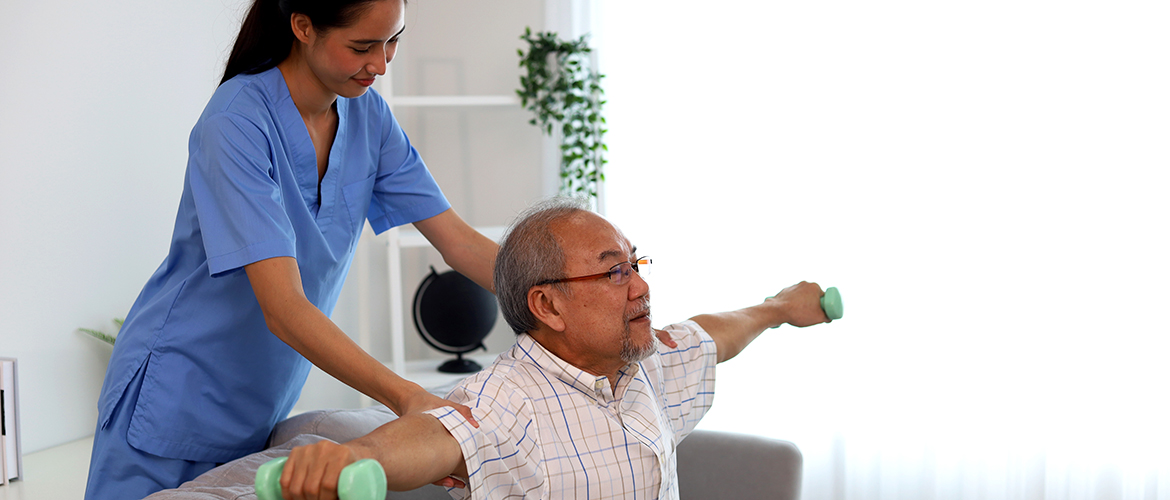As you care for a loved one living with dementia, it’s important to ensure they receive the right treatments for their individual needs and overall health goals. This is true for everyone but can become even more important following a medical issue such as a broken bone, surgery or hospital stay.
Increasing research has shown that short-term rehabilitation therapies are beneficial not only after a medical event but can also help the general dementia population live as well as possible for as long as possible.
Why Consider Short-Term Rehabilitation?
Short-term rehabilitation – such as physical therapy, occupational therapy and speech language therapy – can be very beneficial to those living with dementia. These therapies provide opportunities to build healthy habits and create routines that positively impact mood, help with day-to-day living skills and improve quality of life.
Although short-term rehab won’t eliminate the symptoms of dementia, it can help slow the progression of the disease.
Three Types of Therapy
Short-term rehabilitation therapy and dementia care go hand-in-hand and provide many benefits – including improved physical, emotional and social health. Let’s take a closer look at the three most common types of short-term rehab and how they can make a difference in the life of those impacted by dementia.
NO. 1: PHYSICAL THERAPY (PT)
Not surprisingly, one of the main areas that physical therapy affects is physical health. It’s the name of the game, and there are many benefits to be gained that go beyond physical strength and post-op recovery.
Aerobic exercise, resistance training, and stretching and flexibility are just a few examples of physical therapy that can positively impact cognition. There are also other benefits:
- Improve balance and gait: While falling is a danger for many seniors, it can be an even bigger issue for dementia patients. PT is a great way to improve balance and decrease the risk of falling.
- Relieve and strengthen stiff muscles: Dementia affects more than just the brain; it affects muscles, too. PT can improve flexibility and muscle strength to help with participating in day-to-day activities. This not only keeps one occupied but can, in turn, lift one’s sense of accomplishment.
- Improve cardiovascular health: Heart-healthy PT certainly contributes to better heart health, but it also boosts the immune system … providing strength to fight the bigger battle.
- Emotional health: During exercise, blood flow to the brain increases and the body releases chemicals such as dopamine. These “feel-good” chemicals come with a long list of benefits – slowing mental decline; improving mood and reducing depression; reducing stress and lifting self-esteem. Creating a sense of calm can help reduce episodes of aggression, wandering or agitation.
NO. 2 OCCUPATIONAL THERAPY (OT)
Occupational therapy is most often associated with functional daily living skills – both the ability to perform tasks and doing them safely. Think of activities like grocery shopping, doing the laundry or calling a loved one to keep in touch.
OT offers ways to practice, develop new strategies and include adaptive devices into daily life to help with activities like eating, dressing and bathing. Some other benefits of occupational therapy are:
- Independent living: An improved ability to do daily tasks like light meal preparation, shopping for personal items and paying bills on time.
- Staying in touch: Maintaining the ability to communicate by using a phone or computer.
- Environmental adjustments: This can include support measures such as a dementia-friendly clock, labeled doors and drawers, or orientation strategies for one’s surroundings.
NO. 3 SPEECH AND LANGUAGE THERAPY (SLT)
Speech therapy treats issues related to communication, speech, language and swallowing. These therapies are especially helpful for those with dementia because speech-related challenges can be improved through coping strategies which support independence and confidence.
- Increase brain strength: Focuses on restoring memory, sequencing, problem solving, safety awareness and attention.
- Build social connections: Expressing language through traditional and alternative forms (letters, body language, email, etc.) to convey desires to facilitate a sense of socialization and connection with others.
- Strengthen vocal cords: Speech therapy can help reduce hoarse or harsh voice quality, improve word articulation and address aphasia speech challenges.
- Improve ability to eat: Safer eating practices reduce stress for all involved. SLT therapies help improve drinking and swallowing difficulties and can offer therapies to help with mealtime.
- Communicating wishes: It’s important to gauge one’s ability to process information accurately, especially with matters such as consent to treatment and care. SLT can help with this assessment which is important for both the individual and their caregiving team.
These three therapies can play an important role on the path to lasting recovery, and James L. West Center for Dementia Care is now offering short-term rehab treatment sessions to help build strength and mobility to better carry out day-to-day activities while also striving to reduce caregiver stress.

